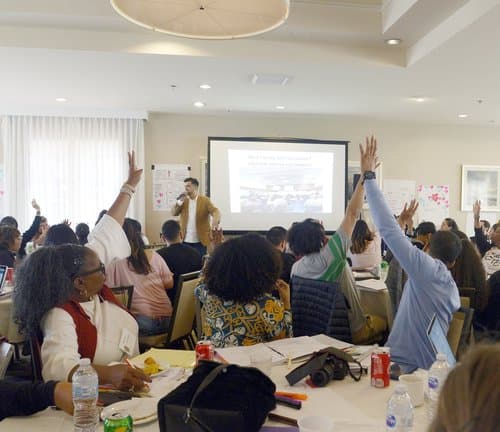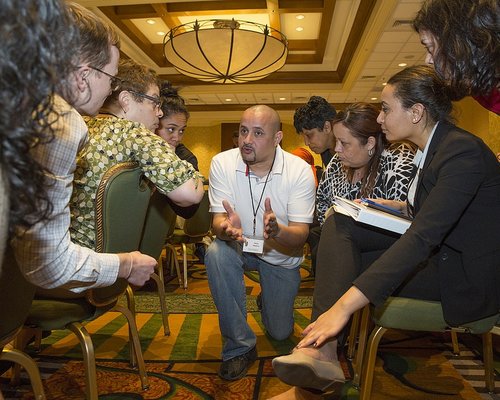VALUES DRIVING PARENT EMPOWERMENT
"We have this uncompromising belief in the infinite capacity of every child to learn, grow, create, be brilliant and lead. We must have that same belief in their parents.”
— Matt Hammer
Founder and CEO
Innovate Public Schools
All education endeavors, and certainly any parent empowerment efforts, should lay out a set of explicit values that articulate:
- How parents lead the work of changing education in their communities, and
- The role of nonprofit leaders and funders as allies of parent-led efforts.
Even with good intentions, education reform is not immune to the problem of implicit bias. And this bias frequently manifests in beliefs about the ability of parents to drive change in their communities.
Too often, well-intentioned education efforts discount parents out of a misguided belief that if parents were part of the solution, they would have already addressed the problem. These efforts diagnose the imbalance of power faced by many communities with failing education systems, and then inadvertently perpetuate that power imbalance by continuing to exclude parents.
Education reform will never achieve the systems-level change we desire if these are the values by which we operate. "We have this uncompromising belief in the infinite capacity of every child to learn, grow, create, be brilliant and lead. We must have the same belief in their parents,” counsels Matt Hammer, Founder and CEO of Innovate Public Schools.
So what do values look like that put parents at the center of education change?
The following six values guiding parent empowerment in education were developed through deep dialogue and self-reflection with leaders from 18 parent empowerment organizations.
The “we” in these values are nonprofit leaders and funders in reflecting on our role as allies to parent-led efforts.

1. POTENTIAL
We believe in the inherent potential of every child, regardless of background. All children deserve a public education system that helps them realize that potential.

2. URGENCY
Parents have an urgency to act when they know that their education system is not enabling children to reach their potential.

3. INFORMATION
Parents will know what is best for their children if they have access to timely, accurate and actionable information.
Our role is to provide parents with the information that they need to navigate their education system and understand if the system is or is not working for their children. This requires us being clear on the message and also earning the role of a trusted messenger.

4. POWER
Parents have innate power, but often live within systems that disenfranchise them from exercising it.
We don't empower them. Rather, we support them in discovering how to find and use their power – individually and collectively – to overcome those systemic barriers.

5. AGENDA SETTING
Parents should be integral in setting the agenda for education change.
Our role is to leverage our knowledge, skills, and resources in partnering with them to set and execute on a common agenda. Our relationship with parents in forging that agenda requires constant listening, reflection and building our credibility as allies.

6. SOCIAL JUSTICE
Ultimately our efforts, and the efforts of parents, go beyond education justice and are about social justice. A high-quality education for all is only one component of a safe, vibrant, civically enfranchised and economically secure community.
Of course, changing values does not by itself repudiate or dispel bias.
Many communities have been disenfranchised from their education system (and more broadly their social system) for generations. It should not then be surprising that they tend not to trust those who have authority in that system, nor outsiders coming in. These communities have heard a lot of words, and ours will mean nothing without intentional, credible actions.
Nonetheless, words can be an important starting point – including those that clearly define an organization’s values. Values put a stake in the ground about what an organization will hold itself accountable for and what it will hold others accountable for.
As your organization – be it a nonprofit, a school or a philanthropy – explores its role in driving education change through, we encourage you to take the journey as a team to develop internal clarity on your organization’s values around parent power and your role as allies to parents (or feel free to adopt or adapt the values shared here).
225 Franklin Street, Suite 350
Boston, MA 02110
617.912.8800
This work is licensed under a Creative Commons Attribution-NonCommercial-ShareAlike 2.0 License (CC BY-NC-SA 2.0)
Click Here to learn more.

